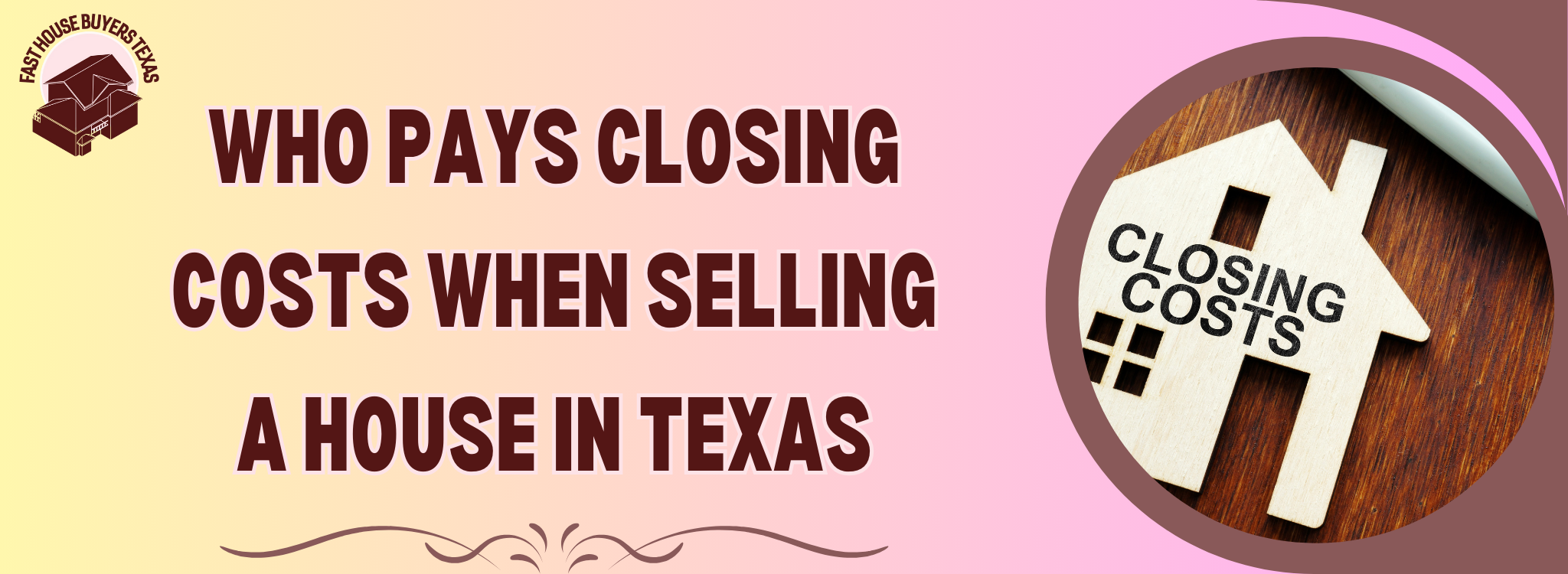
Understanding Closing Costs When Selling a House in Texas
Understanding the closing costs is essential when selling a house. In Texas, these costs vary depending on location and market conditions. Knowing these expenses helps sellers plan their budget and make the selling process smoother.
What are the standard closing costs for sellers in Texas?

Sellers in Texas face various closing costs, such as:
- Title Insurance: This protects against ownership disputes. Typically, the seller pays for it in Texas.
- Escrow Fees: These are paid to the escrow company managing the transaction funds. In Texas, these fees are usually split between the buyer and seller.
- Homeowners Association (HOA) Fees: Prorated HOA fees may be due at closing if applicable.
- Title Company Fees: These cover services ensuring a clear title transfer to the buyer.
- Survey Fees: Depending on the agreement, the seller may need to provide a property survey, which adds to the costs.
Understanding these costs helps sellers anticipate financial responsibilities during a real estate transaction in Texas.
How do realtor fees impact seller closing costs?
Realtor fees play a significant role in determining seller closing costs. Here’s how they affect the sale:
- Commission Fees: Real estate professionals usually charge 5% to 6% of the sale price in Texas.
- Real Estate Professionals Fees: These fees cover services like marketing and negotiation. While they form a large part of closing costs, they provide professional assistance throughout the sale.
- Impact on Seller’s Net Proceeds: The fees reduce the seller’s profit from the sale, but they are considered necessary for a successful transaction.
For more insights into the real estate process in Texas and expert advice, visit Fast House Buyers Texas.
Exploring Buyer and Seller Responsibilities for Closing Costs
Can buyers negotiate with sellers on who pays closing costs?

In Texas real estate, negotiation is key to deciding who pays closing costs. Both buyers and sellers can discuss how to split these expenses. This process includes looking at the lender’s terms and any financing contingencies in the purchase agreement. Who pays closing costs in Texas can vary based on market conditions and specific transactions. Buyers can often negotiate with sellers on these costs, leading to a better financial deal.
Are there typical incentives for buyers to cover closing costs?
In Texas real estate, various incentives help buyers with settlement fees. These might include closing cost assistance programs, which can ease the financial load. Such programs can cover financing fees, escrow fees, and even prepaid interest. Sellers may offer these incentives to attract buyers in a competitive market. This makes the property more appealing and reduces some of the buyer’s upfront costs. Knowing how these incentives work can help buyers maximize Texas real estate market opportunities.
For more information or personalized assistance, consider contacting Fast House Buyers Texas to explore your options further.
Strategies to Reduce Closing Costs
What are some tips to minimize seller closing costs in Texas?

Selling a house in Texas can be more profitable if you reduce seller closing costs. Here are some simple ways to do that:
- Negotiate Real Estate Transaction Fees: You can cut costs by negotiating fees related to the real estate transaction. This includes finding better deals on real estate professional fees or considering flat fee options.
- Offer Incentives to Buyers: Incentivizing buyers to cover some closing costs can make your property more appealing. This might help sell your home faster and encourage higher offers.
- Understand Seller Fees: Learn about the typical seller fees when selling a house in Texas. Knowing these fees helps you plan better and avoid surprises during home-selling.
By planning carefully and seeking professional advice, you can effectively lower these costs.
How can a real estate professional help in lowering closing expenses?

Real estate professionals are crucial in helping sellers reduce closing costs. Here’s how they can help:
- Expert Negotiation Skills: Real estate experts can negotiate better terms, potentially lowering commission fees and helping with seller contributions to closing costs in Texas.
- Cost-Saving Assistance: With their knowledge of the Texas real estate market, experts can spot cost-saving opportunities that sellers might miss.
- Reassessing Commission Fees: Exploring options like variable rate commissions or finding a realtor who matches your financial goals can help reduce costs and improve your bottom line.
Working with an experienced real estate professional can efficiently manage and lower closing costs while ensuring a smooth sale.
Insights into Additional Fees During a Real Estate Transaction
What are some unexpected costs when selling a home?
Selling a house often involves additional expenses that catch sellers off guard. Although your main goal should be to get a good sale price, take into account these extra costs that might lower your net profit:

- Home Inspection: A home inspection could find problems that need repairs before listing, making the house more appealing to purchasers.
- Home Repair Costs: Should the inspection reveal anything, you could have to budget for repairs. These can range from minor fixes to major renovations.
- Staging Costs: Staging your home is important to attract buyers. It entails arranging furniture and décor to appeal to the house, thus increasing its attractiveness and accelerating sales at better prices.
- Moving Costs: Also consider moving costs. Depending on what you need to do, leasing a truck and hiring movers could add up.
- Pest Inspection Fees: Some regions demand a pest report before selling. If issues surface, you will have to pay for the extermination.
- Earnest Money Deposit: Buyers pay an earnest deposit to convey their seriousness. Should seller conditions cause the deal to fall through, you could have to reimburse this money.
- Utility Transfer Fees: Fees are charged when utilities are transferred to the new owner. This covers closing present accounts and opening new ones.
- Relocation Costs: Depending on how far you’re moving, relocation expenses might also include travel or temporary housing.
How does title insurance affect the total closing cost?
A main component of closing expenses in real estate transactions, title insurance offers lenders and buyers crucial protection:

- Title Insurance: Title insurance guards against later ownership claims or conflicts. Paid one at closing.
- Title Search Fee: Before providing title insurance, the property is thoroughly searched for liens or legal problems.
- Settlement Fees: Settlement fees are administrative expenses for the title company covering tasks and closing the transaction.
- Title Company Fees: Title companies oversee several closing details, including document preparation and team coordination with others.
- Deed Preparation Fees: Title companies oversee several closing details, including document preparation and team coordination with others.
Knowing these fees helps avoid surprises at closing. Fast House Buyers Texas is ready to help with house sales and provides professional advice throughout the process.
Special Cases and Considerations for Closing Costs in Texas
How do property taxes influence closing costs?
In Texas, property taxes greatly impact the closing costs during a home sale. These taxes are usually divided between the buyer and the seller based on how long each owns the house within the tax year. Sellers typically cover their share of property taxes up to the closing date, which affects the overall expenses of selling a home in Texas.
Property taxes can differ greatly depending on the property’s location and value. This can influence the costs and total expenses you must manage in a real estate deal. Buyers and sellers must understand how these taxes are figured out and paid to ensure the closing goes smoothly. Sometimes, an escrow account is set up to handle ongoing tax payments, offering peace of mind to both parties.
What role do HOA fees play in the closing process?

Homeowners Association (HOA) fees are another important cost when figuring out the expenses in a Texas real estate deal. These fees pay for maintenance and amenities provided by the homeowners association and can greatly affect the expenses at closing.
When a home is part of a homeowners association, any outstanding fees must be paid off during escrow. This ensures there are no liens or debts on the property that might complicate the sale. Also, utility transfer fees, title insurance, and other settlement fees must be accounted for to ensure all money matters are squared away.
Buyers and sellers can better handle the closing costs in Texas real estate deals by considering property taxes and HOA fees, ensuring a smooth experience with companies like Fast House Buyers Texas.
FAQs:
What are the typical closing costs when selling a house in Texas?
In Texas, closing costs include escrow funds, property taxes, title insurance, and search fees. Sellers may also have to pay transfer taxes and real estate professional commissions. Knowing these costs helps with budgeting.
Who generally pays for closing costs during a home sale in Texas?
Closing costs apply to both buyers and sellers in Texas. Buyers typically pay for mortgages, inspections, and loan origination fees, whereas sellers usually pay for real estate commissions and may contribute to title insurance. Negotiating these details with the buyer is critical.
How can homeowners estimate their closing costs when selling in Texas?
Homeowners can use online calculators to estimate closing costs, which include property taxes, real estate expert fees, and possible liens.
What role do title companies play in the home selling process in Texas?
Title companies facilitate the transfer of property ownership by conducting a title search and ensuring no liens on the property. Before closing the transaction, they monitor escrow accounts and ensure all terms are met.
Are there assistance programs available to help with closing costs in Texas?
Texas’ closing cost assistance programs benefit both homebuyers and sellers. These programs frequently offer financial assistance to first-time buyers and those purchasing in specific communities. Additional information can be obtained from local housing agencies.
Do sellers in Texas often negotiate closing costs with buyers?
In Texas, closing costs are typically negotiated. Sellers may agree to pay certain costs, such as title insurance, to attract buyers. Both parties should include a detailed explanation of these terms in their sales contract.
How does a home appraisal affect the selling process in Texas?
Lenders require a home appraisal to determine the property’s market value. This value affects both the sale price and the amount a buyer can borrow. Sellers should ensure that their home is in good condition to get a good appraisal.
What additional fees should be expected when selling investment properties in Texas?
In Texas, selling an investment property may incur additional fees, such as a higher capital gains tax and extensive maintenance documentation. Real estate investors should consult financial advisors to understand the tax implications fully.
Key Insights
- Texas closing expenses include lender fees, attorney fees, and title insurance premiums, among other fees.
- While buyers handle loan origination and mortgage payoff fees, Texas sellers typically pay commission fees.
- Selling a Texas property requires prorated taxes, recording fees, and transfer tax real estate expenses.
- Home appraisals, prepaid interest, and PMI expenses could all be part of buyer closing costs.
- In Texas, the home-selling process could involve negotiating closing costs, knowing seller contributions, and determining seller fees.
- Closing expenses in a Texas house sale mainly include title search fees and deed preparation costs.
- Programs for community assistance and closing cost aid help control costs.
- Relocation expenses for a Texas house sale could include utility transfer fees, which the buyer or seller must negotiate.
This information applies to Texas and its cities, including Houston, Corpus Christi, San Antonio, McAllen, Harlingen, and Brownsville. For assistance or inquiries, please call us at (956) 204-3333. You can also visit our website, Fast House Buyers Texas, for more details.
Get An Offer Today, Sell In A Matter Of Days…
More Helpful Articles for Homeowners in Texas


